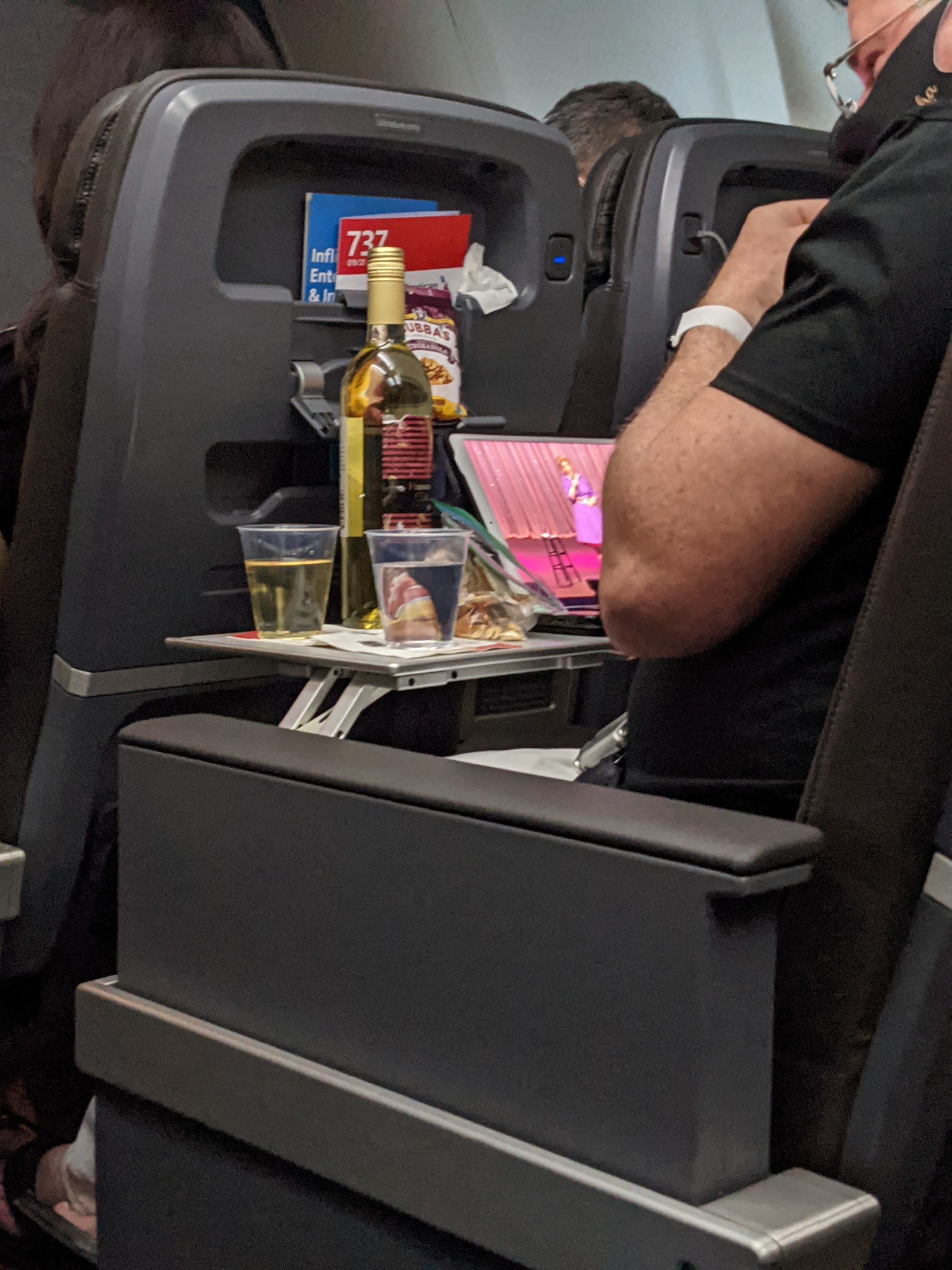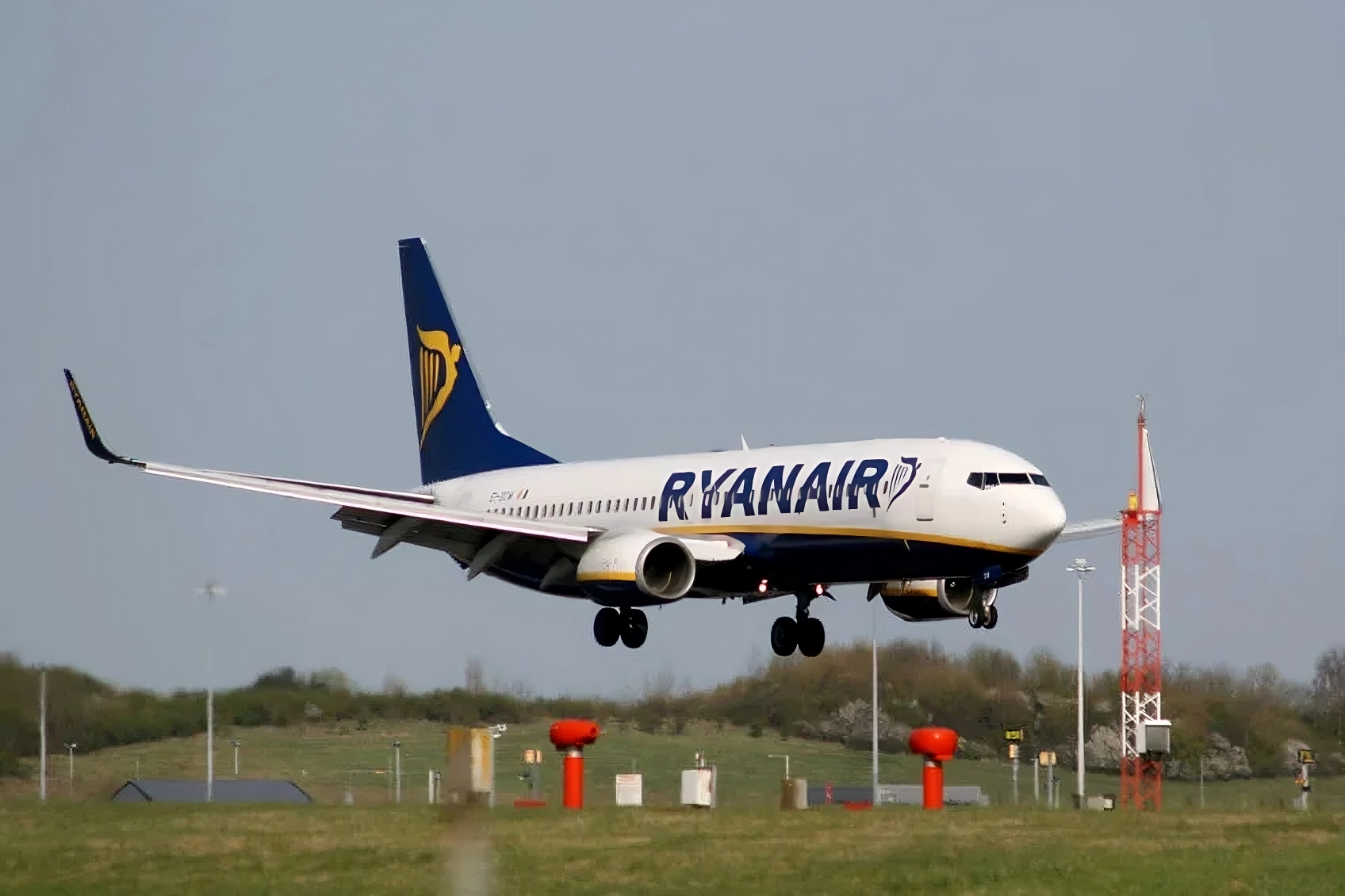Europe’s Ryanair is calling for airports to impose a two-drink limit on passenger alcohol consumption to reduce inflight incidents that lead to flight diversions.
Here’s a group of women pregaming at airport security, because they can’t bring their own booze into the airport.
Here’s a passenger with their own bottle of wine on short Charlotte – Miami flight.

Credit: R. Tedrow, Used With Permission
And here a drunk Russian passenger attacks cabin crew, gets taken into custody but tears apart the flexcuffs, and tries to smash a plane window.
Aeroflot plane Dubai-Moscow had to make an emergency landing in Baku because of an inadequate Russopithecus in the cabin. According to passengers, at first he was calm… But suddenly a demon entered him, he began to hit the porthole and howled in pain "KHOHLYYYYYYYY",… pic.twitter.com/wcWaywwV0x
— Malinda (@TreasChest) December 28, 2024
Yet it’s an excruciatingly small percentage of passengers who create problems, and most who drink in airports order a single drink and don’t finish it. The sort of systems airports would have to build to track consumption by passenger across their journey would be incredibly intrusive – for everyone – as well as cumbersome and costly. Yet the problem is most easily addressed by the airlines themselves.
- Airport alcohol sales compete with onboard alcohol sales. Ryanair isn’t proposing that they stop selling alcohol only that airports reduce their own sales.
- Number of drinks isn’t the issue in any case. Passengers are in the airport for varying lengths of time. Passengers are different in weight and tolerance. And they drink difference things with varying alcohol content. Two may be a lot to down as you run through security to your gate, not so much with a six hour layover.
- Airlines have been cutting airport staffing. Gate agents just don’t have the time to monitor passengers in the boarding gate and during the boarding process to identify those who may be under the influence. Ryanair is deflecting responsibility for its own role here in allowing passengers who shouldn’t fly onto its aircraft.
- In fact, the issue with Ryanair is greater than most airlines because gate agents have more enforcement to do and more fees to extract, which trump in importance compared to evaluated passengers.
- Two drinks at the airport plus drinks on board is certainly enough for many people to get obnoxiously drunk, if that’s their predisposition.
Is it even practical to limit alcohol purchases by passenger in an airport? It would be one thing to say each vendor could only sell two drinks to each person. But that wouldn’t accomplish much. Most airports have plenty of different places to drink.

So Ryanair suggests using a boarding pass to track people, although it’s underspecified exactly how this would work. Does each boarding pass come with drink tickets? And is each drink ticket tracked electronically in a central database (because passengers can reprint their boarding pass, or screen shot it with those coupons intact)?
And if each boarding pass is ‘worth’ two drink purchases, it seems like there’s now a market value in boarding passes. If you’re not a drinker you can sell the right to your drinks (or to your second drink if you’re only buying one) to those who want more than two. Are you going to criminalize this? Because if not, then two drink chits isn’t going to be a binding constraint for the small percentage of passengers that want more than two.
Ultimately it turns out that drinking on planes is worse for you than drinking in airports. One study finds that sleeping inflight after drinking increased heart rates and reduced blood oxygen levels, increasing risk of heart attack.
Ryanair can (1) keep visibly intoxicated people off its flights, if they wish (they just choose not to invest in doing so), and they can (2) stop selling alcohol inflight, so passengers don’t become more inebriated (they just choose not to give up that revenue).
The call to have airports create new systems to track and limit drinking is a complete ruse, a marketing ploy, just like the airline’s CEO Michael O’Leary has been talking up for the past 20 years charging to use the lavatory; making passengers stand inflight; and giving away all tickets free while earning revenue from them through inflight gambling. None of this ever happens.

Meanwhile the European Commission considers current rules sufficient so this is a complete non-starter.


A travel expert who claims ignorance about how tracking by boarding pass might work either has an agenda or is no expert at all.
It’s no different than getting scanned into an airline lounge. Buy drink, scan pass, update record with number of drinks.
Of course whether the expense of implementing that system is worth it is open for discussion (well, not really, it obviously isn’t), but claiming implementation is some sort of functional mystery is ridiculously silly.
Also, who is paying $15+ for an airport drink and not finishing it? Especially when so many airports these days let you bring your drinks to the gate? Maybe your claim that most people don’t finish their drinks is another indication of an agenda…
End of the day, if we’re going to let bars serve alcohol at the expense of thousands of DUI deaths a year, I can’t see doing anything about airplane intoxication, at least in the US.
Sometimes, a few pilots will join passengers to pregame before their flight. For example, according to WTOC News, a Southwest Airlines pilot was arrested today for DUI while on the plane at the Savannah/Hilton Head International Airport for allegedly arriving to work intoxicated. Southwest Flight 3772, scheduled to fly from Savannah (SAV) to Chicago Midway (MDW), was grounded for over four hours. Savannah/Hilton Head International Airport police boarded Southwest Airlines flight 3772 and arrested the pilot. WTOC contacted Southwest Airlines and received the following statement: “We’re aware of a situation involving an Employee on Flight 3772 this morning from Savannah. The Employee has been removed from duty. Customers were accommodated on other flights and we apologize for the disruption to their travel plans. There’s nothing more important to Southwest than the Safety of our Employees and Customers.”
I would be perfectly fine with no alcoholic drinks available onboard and none in the airport along with no sale of bottles or cans of alcoholic drinks. If someone wants to transport such, they can pack it in their checked luggage. Any pregaming would be done before arriving at the airport or in a vehicle in the parking lot. A whole lot of bad behavior would be stopped. The rest of us suffer so some can profit.
Frankly, I’m suspicious of anyone on a Ryanair flight that isn’t drunk and belligerent.
Ryanair has been whining about this for /years/. I might suggest that, among other things, perhaps their choice of clientele makes it a bit more likely for them to have these issues? I’ve been wishing for some years that the British government would respond with a face-slap rejoinder press release pointing out what Ryanair /can/ do and /chooses/ not to do, and offering to discuss the matter further when Ryanair begins taking proactive steps on their end.
Like, if they’re so hot to trot on it, why not just give the GAs breathalyzers and the power to bar anyone who blows over a certain level…and then set that to whatever level their two-drink limit “should” hit?
(Also, in addition to layovers – which can vary, of course – there’s also the question of lengthy flight delays. I don’t think it is reasonable to say that someone can’t have a third beer if they’ve been in the airport for six hours.)
Yeah: scan your boarding pass. No problem. Build a database that issues two tokens per passenger. Put it on a server. Integrate it into every point of sale. Make it so no alcohol can be billed without a token (otherwise, why bother?), so now you’re integrating it with a number of other systems. Regular auditing of menus and service to ensure that A) alcohol served matches a range established for each token, B) merchants don’t just scan each BP of each customer and charge them a token, C) things like free doubles don’t get introduced. Introduce the service into the lounges.
Disruptions of service due to alcohol happen around world. The biggest group that makes the news consists of UK holidaymakers and assoc. football fans on low-cost airlines. Then there’s individuals on US locos. Finally, we get the folks who mix Ambien and booze.
Ryanair’s problem is group alcohol consumption on ‘holiday’, where one or more members go under the volcano. This is precisely the group that will circumvent heavy-handed restrictions.
Besides, I’m sure that Ryanair’s $15K diversion cost doesn’t approach the total bar tab of Bristol airport for a single day.
We have a mental health/proper adult behavior crisis in western culture, particularly the US. This is often exacerbated by drugs and/or alcohol, usually both. Until society figures out to solve the first part airport/airplane meltdowns will continue. But our medical industrial complex is too far concerned with giving out jabs and pills than to address this 800 pound gorilla that has come from the wild into everyday life.
Southwest Airlines fosters a culture that supports employees struggling with substance abuse, alcohol overconsumption, or mental health issues, which has led to an excellent employee support program. To prioritize safety, Southwest Airlines emphasizes its commitment to safety, recognizing that intoxicated employees pose a risk to everyone. The airline states that its top priorities are customers’ and employees’ safety and security. As Southwest Airlines seeks outstanding flight attendants, I have included helpful information regarding Southwest Airlines’ expectations during flight attendant training. Please consider applying for a position with Southwest Airlines, as I value excellent service when flying.
Read more:
https://www.swauniversity.com/preclass/Inflight_Preflight_Packet.pdf
https://www.southwest.com/assets/pdfs/corporate-commitments/safety-commitment-pol.pdf
https://colleenbarrett.com/